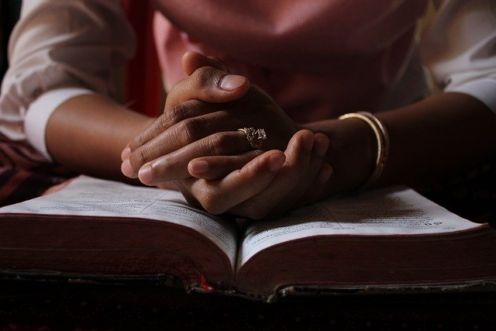Today’s post is from Fr. Phil Cover who is currently serving a spiritual director on our directed retreat this week. He shared this beautiful homily during Mass on Monday and we thought you would enjoy it too. Let’s take a few quiet moments to reflect together…
Memorial of Saint Irenaeus, Bishop and Martyr
Scripture: Gn 18:16-33, Mt 8:18-22
As we begin this weeklong retreat, our first reading this morning directs our attention to prayer. The first thing our first reading brings to our attention is that prayer is about a relationship; in this instance, a relationship between Abraham, the one engaged in praying, and Yahweh, the one engaged in listening and answering prayers.
Is Abraham is being persistent or is he acting as good bargainer, or is he discerning the will of God? We know for sure he is approaching Yahweh from a heart of compassion. He is troubled that upright people will be destroyed along with the guilty. So he prays, “I trust my Lord will not be angry if I speak once more: perhaps there will only be ten.’ ‘And a loving, compassionate answer is given, “I shall not destroy it for the sake of the ten.”
The scriptures are full of stories about prayer. Recall Israel’s battle against the Amalekites. As long as Moses keeps his hands raised the battle went in Israel’s favor, but when he puts down his hands, then Israel begins to lose. So Aaron and Hur come to Moses’ assistance as liaisons, helping to keep his hands raised until evening when Amalek has been defeated and Moses’ prayer has been answered. We recall the persistence of the widow before the unjust judge. She finally wears him down by dogged determination.
We remember the story of the Pharisee and the Tax Collector who both come to the temple to pray. The Pharisee begins by thanking God that he is “not like other men.” For the Pharisee the real action is between him and the tax collector. God, the focus of all genuine prayer, has receded completely into the background in the Pharisee’s prayer. The tax collector on the other hand bows in reverence and beats his breast in repentance. He takes note of no one else. He simply opens his unworthiness, his poverty of spirit, to divine mercy. In the end only one prayer results in justification, the one who had nothing to offer.
What are we to take away from what the Hebrew and Christian scriptures seek to teach us about prayer? Let me offer four invitations.
First, we should never judge our prayer, why, because prayer is not about doing it right. It is about pouring out our hearts to God, answering the question Jesus asked Bartimeaus—what do you want me to do for you?
Second, once we have poured out our hearts, then prayer becomes an alignment of desires—God’s desire for me, and my desire for God. In other words, we come before God reversing Jesus’ question. We now ask God, what do you want me to do for you? Thus, we are poised to have God search our prayer, refine, reshape, refashion everything we poured out to God until all our wants and desires become one
with God’s desire and prayer for us.
Third, last evening in our prayer service, we recall Paul’s words—when you do not know how to pray or can’t pray, ask the Spirit to pray for you. The Spirit, who searches all things, even the deep things of God, intercedes for us with prayers that groans, too deep for words.
Finally, we are to pray always. How do we pray always, without ceasing? The gifted spiritual writer and teacher Margaret Silf proposes this for consideration. “Just as the fish lives and moves and has its being in the water, without needing to know what water is or where it comes from. Just as birds fly through the air without needing to know how it is held and propelled by the invisible reality. So we can live and move and have our being in God trusting the tides and currents of God’s love, that holds us, and moves us, console and disturb us, nourish, guide and challenge us, To live in this reality is to be in prayer every moment.”
